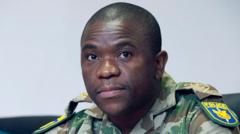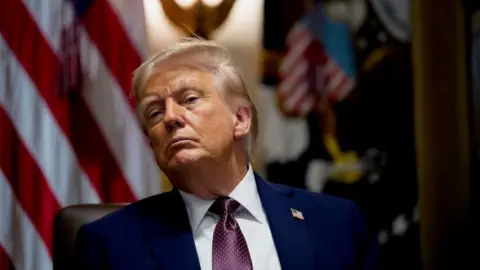In a shocking turn of events, South African police officer Gen Nhlanhla Mkhwanazi has ignited a national conversation with his serious allegations against Police Minister Senzo Mchunu. Clad in a military-style uniform and flanked by heavily armed officers, Mkhwanazi convened a press conference where he accused Mchunu of maintaining connections with organized crime syndicates. The police chief went further, alleging that Mchunu disbanded an elite unit dedicated to investigating political murders after it uncovered links to a drug cartel that influences various sectors, from business to the judiciary.
Mkhwanazi’s address, broadcast live on national television, has resonated with the public amid widespread concern over rampant organized crime in South Africa. Criminal activity remains a critical issue in the nation, and allegations of corruption within the police force only compound citizens' fears. The legacy of former police chief Jackie Selebi, who served time for facilitating criminal enterprises, remains fresh in public memory.
The immediate reaction to Mkhwanazi's claims has spotlighted the public's growing dissatisfaction with police corruption, a sentiment captured by Dr. Johan Burger, who noted the alarming state of organized crime. Although Mchunu has dismissed the accusations as “baseless,” the tide of public support has shifted in Mkhwanazi's favor. Known for his tenacious stance against political interference in law enforcement, Mkhwanazi previously earned accolades for suspending corrupt officials when he served as acting police chief.
The outpouring of support for Mkhwanazi has sparked a social media campaign branded with the hashtag #HandsoffNhlanhlaMkhwanazi, demonstrating that many citizens view him as a heroic figure fighting against systemic corruption. His direct confrontation with political leadership marks a significant moment in South Africa's policing narrative. Despite previously experiencing struggles with political pressures, Mkhwanazi's commitment to exposing corruption has kept him at the forefront of the national conscience.
While Mchunu's position is now under scrutiny, the incoming police minister, Firoz Cachalia, acknowledges the need for accountability. However, the stakes are high for Mkhwanazi; he must substantiate his allegations if he is to retain his reputation and avoid potential fallout.
This saga illustrates a critical crossroads for South Africa’s police force—whether they will pivot towards reform or remain entrenched in corruption. For now, Mkhwanazi's bravery in speaking out has elevated discussions on police integrity and accountability in the nation.




















